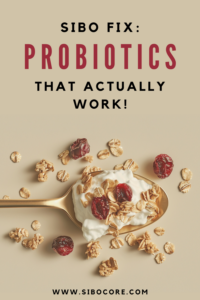Dealing with Small Intestinal Bacterial Overgrowth (SIBO), which happens when there’s too much bacteria in the small intestine, can be super frustrating—especially when it feels like nothing’s working. If you’ve been through it, you know how overwhelming it can be. But here’s some good news: probiotics might actually help you manage your symptoms. In this guide, we’ll break down how probiotics work, the best strains to try, and simple ways to fit them into your daily routine. Let’s get started!
The Role of Probiotics in Gut Health
Probiotics are foods or supplements that contain live microorganisms (bacteria or yeast) intended to maintain or improve the “good” bacteria (normal microflora) in the body.
Benefits of Probiotics:
- Restore Gut Balance: Replenish the good bacteria in your gut, especially after it’s been thrown off or Crowding Out Bad Bacteria by taking over and pushing out harmful ones, helping to keep overgrowth in check.
- Boost Immune Health: Give your body’s natural defenses some extra support. Some probiotics create substances that can stop harmful bacteria in their tracks. (source)
- Improve Digestion: Help your gut break down food more smoothly and efficiently.
- Ease Inflammation: Soothe gut discomfort and reduce inflammation. (source)
- Strengthening your gut’s protective barrier: Helping the gut lining block harmful bacteria and toxins while allowing nutrients to pass through. It’s essential for keeping your gut healthy and balanced.
A study from 2011 found that people with irritable bowel syndrome (IBS) who supplemented with Saccharomyces boulardii for 4 weeks experienced significant improvements in IBS-related symptoms compared to a control group.
Potential Side Effects and Precautions:
While probiotics are generally safe, it’s important to be aware of potential side effects and take some precautions. Some people might experience mild digestive discomfort like gas, bloating, or diarrhea at first. Allergic reactions are rare but can happen in sensitive individuals. Probiotics might not be suitable for everyone. If you’re immunocompromised or dealing with a severe illness, it’s best to talk to your doctor before starting them.
They can also interact with certain medications. For example, antifungals might make yeast-based probiotics less effective, and those on immunosuppressants should check with their doctor about potential interactions. If you have side effects that persist for more than a few days or experience severe symptoms like a high fever or intense abdominal pain, you should seek medical advice.
How to Incorporate Probiotics into Your SIBO Treatment Plan
There is conflicting information whether probiotics can help with SIBO. For some people, it might not be the best solution, which is why it’s best to consult your doctor first. Usually, it’s better to have resolved the majority of your SIBO before adding probiotics into the mix. This is because SIBO is usually tackled with antibiotics to kill the overgrowth of bacteria and probiotics could add to the overgrowth of bacteria, even if they are good bacteria.
There are multiple ways to incorporate probiotics in your sibo treatment: supplements or fermented foods.
How Fermented Foods Support SIBO Recovery:
Fermented foods are a natural and delicious way to incorporate probiotics into your SIBO treatment plan. These foods—such as yogurt, kefir, sauerkraut, kimchi, and miso—are rich in live, beneficial bacteria that can help restore balance to your gut microbiome. For SIBO recovery, these probiotics may support gut health by crowding out harmful bacteria, improving digestion, and reducing inflammation. Plus, they often come with additional nutrients and enzymes that promote overall digestive wellness.
That said, not everyone with SIBO tolerates fermented foods well, especially in the beginning stages of treatment. The fermentation process can produce histamines or other compounds that may trigger symptoms like bloating or discomfort in sensitive individuals. If this happens, it might be better to start with small amounts and add them to gut-friendly foods, gradually increasing as your gut adjusts, or to focus on probiotics through supplements instead. Fermented foods can be a powerful tool for recovery, but as with any SIBO treatment, listening to your body is key.
Which Probiotic Supplement should You Take?
When you’re choosing a probiotic for SIBO, make sure it includes strains that are beneficial for your condition. Look for products with high CFU counts—the more colony-forming units, the more effective they might be. Also, consider opting for enteric-coated capsules; these protect the probiotics from your stomach acid so they can reach your gut where they’re needed.
Here are a few of the strains that might be beneficial for your problems:
If Diarrhea is a Problem:
- Lactobacillus casei can be a game-changer. It helps regulate gut motility and brings bowel movements back to normal, making it perfect for diarrhea-dominant SIBO. (source)
- Saccharomyces boulardii is another great option. It’s known for its ability to ease diarrhea and works well alongside Lactobacillus casei. (source)
For Bloating and Constipation:
- Bifidobacterium lactis is your go-to. It helps relieve bloating and gets things moving again, which is ideal if constipation is your main SIBO symptom. (source)
If Lactose Intolerance Makes Things Worse:
- Streptococcus thermophilus can help break down lactose, easing gas and bloating caused by lactose intolerance.
To Strengthen Your Gut’s Barrier:
- Lactobacillus plantarum is great for protecting your gut lining. It helps block harmful bacteria and supports your immune system to prevent SIBO from flaring up.
After Antibiotics for SIBO:
- Saccharomyces boulardii is perfect for recovery. It helps restore balance in your gut, reduces inflammation, and keeps bacterial overgrowth in check. (source)
Each of these probiotics has specific benefits depending on your symptoms, so it’s worth tailoring your approach to what your gut needs most!

Frequently Asked Questions About Probiotics and SIBO
1. Can probiotics cure SIBO?
- Probiotics might seem like an odd choice for SIBO since it’s a condition with too much bacteria already. But the idea is that they could help by crowding out the bad bacteria and improving gut motility, which could bring your gut back into balance. That said, it’s not a sure thing yet.
2. Should I take probiotics with antibiotics?
- Healthcare providers usually avoid recommending to take probiotics during antibiotic treatment to maintain gut balance. (After all, antibiotics are killing bacteria and probiotics are adding them. This means the good bacteria might also be killed by the antibiotics.) It’s best to discuss with your doctor what’s the best solution for you.
3. How long does it take to see results?
- This varies per individual: a 2018 study found that it depends on the type of probiotic strain, health condition, product formula, product quality, and dose. For some conditions it takes a few days before the person notices a difference and for some it may take 4-6 weeks.
4. Are fermented foods good for SIBO?
- They can be beneficial but may not be tolerated by everyone with SIBO.
5. Can I take probiotics indefinitely?
- Probiotics are generally safe for long-term use, but it’s best to consult a healthcare professional.
6. What is the difference between prebiotics and probiotics?
- Probiotics are foods or supplements with live bacteria that help keep the “good” bacteria in your body healthy and balanced. Prebiotics are different—they’re high-fiber foods that feed those good bacteria so they can grow and do their job better.
Conclusion
Managing SIBO can be challenging, but incorporating probiotics into your treatment plan may offer significant benefits. From restoring gut balance to enhancing digestion, the right probiotics can make a real difference. Remember, it’s essential to consult with a healthcare professional before starting any new supplement. Here’s to better gut health and a happier you in 2024!

